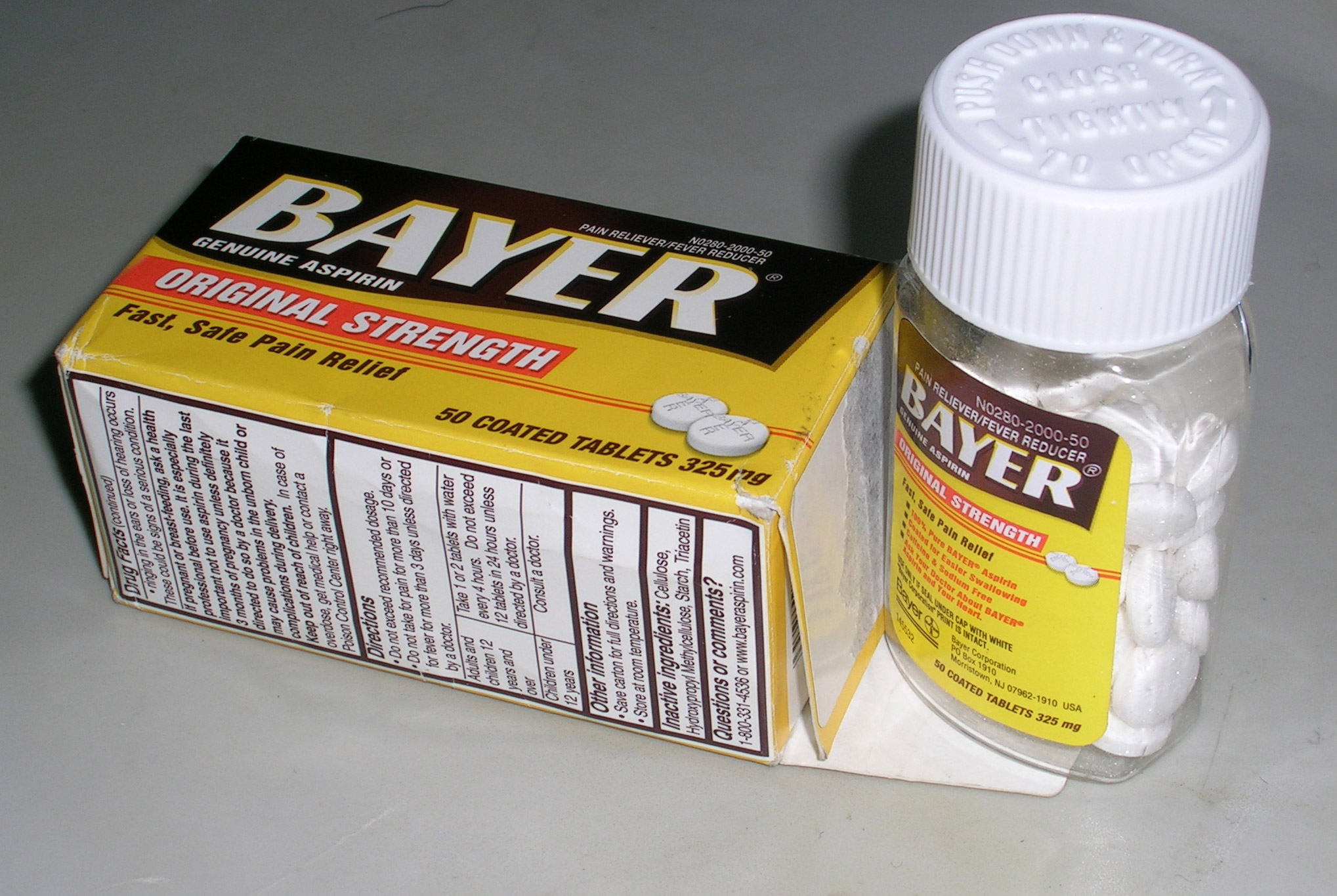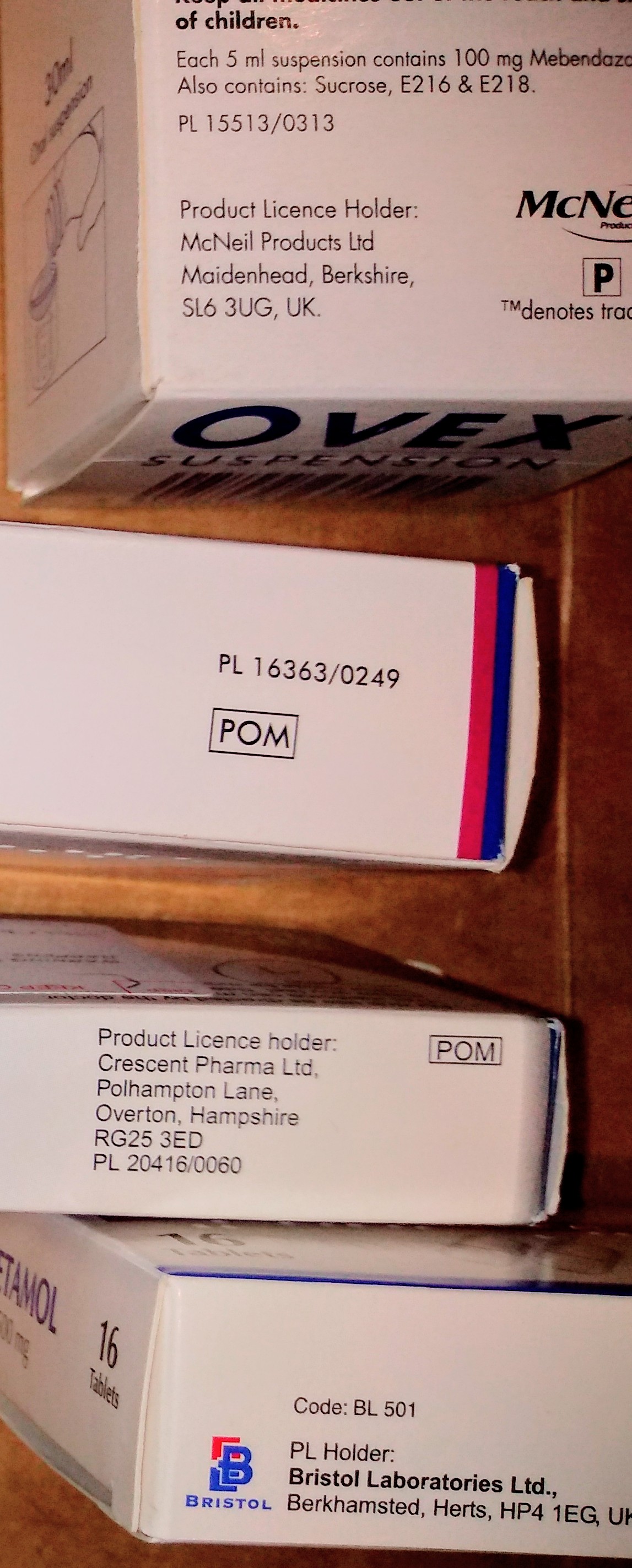|
Medication
A medication (also called medicament, medicine, pharmaceutical drug, medicinal drug or simply drug) is a drug used to diagnose, cure, treat, or prevent disease. Drug therapy ( pharmacotherapy) is an important part of the medical field and relies on the science of pharmacology for continual advancement and on pharmacy for appropriate management. Drugs are classified in multiple ways. One of the key divisions is by level of control, which distinguishes prescription drugs (those that a pharmacist dispenses only on the order of a physician, physician assistant, or qualified nurse) from over-the-counter drugs (those that consumers can order for themselves). Another key distinction is between traditional small molecule drugs, usually derived from chemical synthesis, and biopharmaceuticals, which include recombinant proteins, vaccines, blood products used therapeutically (such as IVIG), gene therapy, monoclonal antibodies and cell therapy (for instance, stem cell thera ... [...More Info...] [...Related Items...] OR: [Wikipedia] [Google] [Baidu] |
Route Of Administration
A route of administration in pharmacology and toxicology is the way by which a drug, fluid, poison, or other substance is taken into the body. Routes of administration are generally classified by the location at which the substance is applied. Common examples include oral and intravenous administration. Routes can also be classified based on where the target of action is. Action may be topical (local), enteral (system-wide effect, but delivered through the gastrointestinal tract), or parenteral (systemic action, but delivered by routes other than the GI tract). Route of administration and dosage form are aspects of drug delivery. Classification Routes of administration are usually classified by application location (or exposition). The route or course the active substance takes from application location to the location where it has its target effect is usually rather a matter of pharmacokinetics (concerning the processes of uptake, distribution, and elimination of dru ... [...More Info...] [...Related Items...] OR: [Wikipedia] [Google] [Baidu] |
Over-the-counter Drug
Over-the-counter (OTC) drugs are medicines sold directly to a consumer without a requirement for a prescription from a healthcare professional, as opposed to prescription drugs, which may be supplied only to consumers possessing a valid prescription. In many countries, OTC drugs are selected by a regulatory agency to ensure that they contain ingredients that are safe and effective when used without a physician's care. OTC drugs are usually regulated according to their active pharmaceutical ingredient (API) rather than final products. By regulating APIs instead of specific drug formulations, governments allow manufacturers the freedom to formulate ingredients, or combinations of ingredients, into proprietary mixtures. The term ''over-the-counter'' (''OTC'') refers to a medication that can be purchased without a medical prescription. In contrast, prescription drugs require a prescription from a doctor or other health care professional and should only be used by the prescri ... [...More Info...] [...Related Items...] OR: [Wikipedia] [Google] [Baidu] |
Drug
A drug is any chemical substance that causes a change in an organism's physiology or psychology when consumed. Drugs are typically distinguished from food and substances that provide nutritional support. Consumption of drugs can be via inhalation, injection, smoking, ingestion, absorption via a patch on the skin, suppository, or dissolution under the tongue. In pharmacology, a drug is a chemical substance, typically of known structure, which, when administered to a living organism, produces a biological effect. A pharmaceutical drug, also called a medication or medicine, is a chemical substance used to treat, cure, prevent, or diagnose a disease or to promote well-being. Traditionally drugs were obtained through extraction from medicinal plants, but more recently also by organic synthesis. Pharmaceutical drugs may be used for a limited duration, or on a regular basis for chronic disorders. Pharmaceutical drugs are often classified into drug classes—groups of r ... [...More Info...] [...Related Items...] OR: [Wikipedia] [Google] [Baidu] |
Prescription Drug
A prescription drug (also prescription medication or prescription medicine) is a pharmaceutical drug that legally requires a medical prescription to be dispensed. In contrast, over-the-counter drugs can be obtained without a prescription. The reason for this difference in substance control is the potential scope of misuse, from drug abuse to practicing medicine without a license and without sufficient education. Different jurisdictions have different definitions of what constitutes a prescription drug. In North America, ℞, usually printed as "Rx", is used as an abbreviation of the word "prescription". It is a contraction of the Latin word "''recipe''" (an imperative form of "recipere") meaning "take". Prescription drugs are often dispensed together with a monograph (in Europe, a Patient Information Leaflet or PIL) that gives detailed information about the drug. The use of prescription drugs has been increasing since the 1960s. Regulation Australia In Australia, the Stand ... [...More Info...] [...Related Items...] OR: [Wikipedia] [Google] [Baidu] |
Nursing
Nursing is a profession within the health care sector focused on the care of individuals, families, and communities so they may attain, maintain, or recover optimal health and quality of life. Nurses may be differentiated from other health care providers by their approach to patient care, training, and scope of practice. Nurses practice in many specialties with differing levels of prescription authority. Nurses comprise the largest component of most healthcare environments; but there is evidence of international shortages of qualified nurses. Many nurses provide care within the ordering scope of physicians, and this traditional role has shaped the public image of nurses as care providers. Nurse practitioners are nurses with a graduate degree in advanced practice nursing. They are however permitted by most jurisdictions to practice independently in a variety of settings. Since the postwar period, nurse education has undergone a process of diversification towards advanc ... [...More Info...] [...Related Items...] OR: [Wikipedia] [Google] [Baidu] |
Medical Prescription
A prescription, often abbreviated or Rx, is a formal communication from a physician or other registered health-care professional to a pharmacist, authorizing them to dispense a specific prescription drug for a specific patient. Historically, it was a physician's instruction to an apothecary listing the materials to be compounded into a treatmentthe symbol ℞ (a capital letter R, crossed to indicate abbreviation) comes from the first word of a medieval prescription, la, Recipere (), that gave the list of the materials to be compounded. Format and definition For a communication to be accepted as a legal medical prescription, it needs to be filed by a qualified dentist, advanced practice nurse, physician or veterinarian, for whom the medication prescribed is within their scope of practice to prescribe. This is regardless of whether the prescription includes prescription drugs, controlled substances or over-the-counter treatments. Prescriptions may be entered into ... [...More Info...] [...Related Items...] OR: [Wikipedia] [Google] [Baidu] |
Medicine
Medicine is the science and Praxis (process), practice of caring for a patient, managing the diagnosis, prognosis, Preventive medicine, prevention, therapy, treatment, Palliative care, palliation of their injury or disease, and Health promotion, promoting their health. Medicine encompasses a variety of health care practices evolved to maintain and restore health by the prevention (medical), prevention and therapy, treatment of illness. Contemporary medicine applies biomedical sciences, biomedical research, medical genetics, genetics, and medical technology to diagnosis (medical), diagnose, treat, and prevent injury and disease, typically through pharmaceuticals or surgery, but also through therapies as diverse as psychotherapy, splint (medicine), external splints and traction, medical devices, biologic medical product, biologics, and Radiation (medicine), ionizing radiation, amongst others. Medicine has been practiced since Prehistoric medicine, prehistoric times, and for most o ... [...More Info...] [...Related Items...] OR: [Wikipedia] [Google] [Baidu] |
Pharmacy
Pharmacy is the science and practice of discovering, producing, preparing, dispensing, reviewing and monitoring medications, aiming to ensure the safe, effective, and affordable use of medication, medicines. It is a miscellaneous science as it links health sciences with pharmaceutical sciences and natural sciences. The professional practice is becoming more clinically oriented as most of the drugs are now manufactured by pharmaceutical industries. Based on the setting, pharmacy practice is either classified as community or institutional pharmacy. Providing direct patient care in the community of institutional pharmacies is considered clinical pharmacy. The scope of pharmacy practice includes more traditional roles such as compounding and dispensing of medications. It also includes more modern services related to health care including clinical services, reviewing medications for safety and efficacy, and providing drug information. Pharmacists, therefore, are experts on drug ther ... [...More Info...] [...Related Items...] OR: [Wikipedia] [Google] [Baidu] |
Vaccine
A vaccine is a biological preparation that provides active acquired immunity to a particular infectious or malignant disease. The safety and effectiveness of vaccines has been widely studied and verified. A vaccine typically contains an agent that resembles a disease-causing microorganism and is often made from weakened or killed forms of the microbe, its toxins, or one of its surface proteins. The agent stimulates the body's to recognize the agent as a threat, destroy it, and to further recognize and destroy any of the microorganisms associated with that agent that it may encounter in the future. Vaccines can be prophylactic (to pr ... [...More Info...] [...Related Items...] OR: [Wikipedia] [Google] [Baidu] |
Therapy
A therapy or medical treatment (often abbreviated tx, Tx, or Tx) is the attempted remediation of a health problem, usually following a medical diagnosis. As a rule, each therapy has indications and contraindications. There are many different types of therapy. Not all therapies are effective. Many therapies can produce unwanted adverse effects. ''Medical treatment'' and ''therapy'' are generally considered synonyms. However, in the context of mental health, the term ''therapy'' may refer specifically to psychotherapy. History Before the creating of therapy as a formal procedure, people told stories to one another to inform and assist about the world. The term "healing through words" was used over 3,500 years ago in Greek and Egyptian writing. The term psychotherapy was invented in the 19th century, and psychoanalysis was founded by Sigmund Freud under a decade later. Semantic field The words ''care'', ''therapy'', ''treatment'', and ''intervention'' overlap in ... [...More Info...] [...Related Items...] OR: [Wikipedia] [Google] [Baidu] |
Pharmacology
Pharmacology is a branch of medicine, biology and pharmaceutical sciences concerned with drug or medication action, where a drug may be defined as any artificial, natural, or endogenous (from within the body) molecule which exerts a biochemical or physiological effect on the cell, tissue, organ, or organism (sometimes the word ''pharmacon'' is used as a term to encompass these endogenous and exogenous bioactive species). More specifically, it is the study of the interactions that occur between a living organism and chemicals that affect normal or abnormal biochemical function. If substances have medicinal properties, they are considered pharmaceuticals. The field encompasses drug composition and properties,functions,sources,synthesis and drug design, molecular and cellular mechanisms, organ/systems mechanisms, signal transduction/cellular communication, molecular diagnostics, interactions, chemical biology, therapy, and medical applications and antipathogenic capabili ... [...More Info...] [...Related Items...] OR: [Wikipedia] [Google] [Baidu] |
Cell Therapy
Cell therapy (also called cellular therapy, cell transplantation, or cytotherapy) is a therapy in which viable cells are injected, grafted or implanted into a patient in order to effectuate a medicinal effect, for example, by transplanting T-cells capable of fighting cancer cells via cell-mediated immunity in the course of immunotherapy, or grafting stem cells to regenerate diseased tissues. Cell therapy originated in the nineteenth century when scientists experimented by injecting animal material in an attempt to prevent and treat illness. Although such attempts produced no positive benefit, further research found in the mid twentieth century that human cells could be used to help prevent the human body rejecting transplanted organs, leading in time to successful bone marrow transplantation as has become common practice in treatment for patients that have compromised bone marrow after disease, infection, radiation or chemotherapy. In recent decades, however, stem cell and cel ... [...More Info...] [...Related Items...] OR: [Wikipedia] [Google] [Baidu] |

.jpg)



.jpg)





